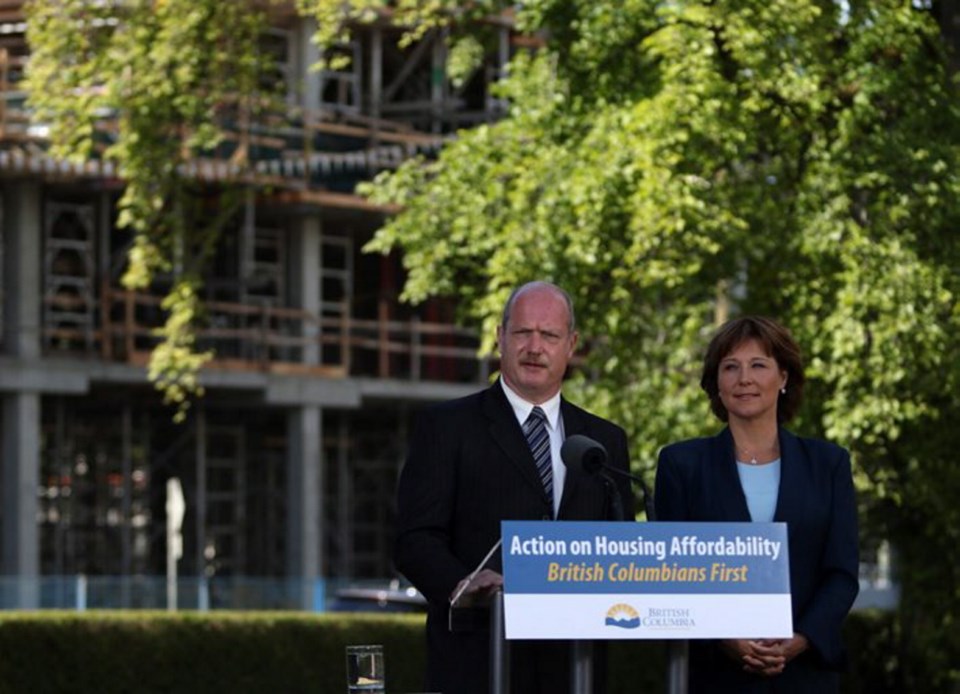B.C. Liberals realized this year that unhappiness was turning in the direction of the government. So the tax, together with the other measures, will fill a gaping hole in the B.C. Liberal election platform to do with housing that the Opposition New Democrats were exploiting.
As a short-term political fix, it might work. From now on, B.C. Liberals are all about making housing “fair and affordable.”
But what kind of impact it will have in the real world is an open question. The legislation will be passed in short order, but there’s another law to think about — the law of unintended consequences. This is just the kind of situation where it usually kicks in.
It’s the most dramatic government move since the harmonized sales tax disaster, announced almost on the seventh anniversary of that blunder. It’s a rush job drafted on pretty scanty background data. It’s a sudden, 180-degree course change for a government that’s been preaching for ages against such a move. And it’s unbalanced right out of the gate, since it only applies to one region.
Starting next Tuesday, foreign buyers of residential real estate in metro Vancouver will pay a special 15 per cent tax on the total value of the property. They’ll pay the standard one per cent property-transfer tax on value up to $200,000, the two per cent on value from $200,000 to $2 million and the three per cent tax — introduced this year — on value over $2 million. Then they’ll pay 15 per cent on the total value. (They’re also excluded from the exemption for new-home purchases.)
On a $2-million home, the property transfer tax now amounts to $38,000. Starting next Tuesday in Metro Vancouver, foreign buyers will pay $338,000, an extra $300,000.
Premier Christy Clark and de Jong both said the goal is not to raise money, although the amounts it could rake in would be considerable. It’s to deflate the demand, without blowing it up entirely.
The theory is that weakening off-shore demand for high-end homes could ease the bidding wars. Stabilizing that end of the market could transfer to the lower-priced sectors and generally relax things, restoring some sanity.
Or not.
The uneven application of the tax to just one region could just as easily drive the foreign money out of Vancouver, but into other areas, such as Victoria. Coupled with the new vacancy tax coming only to Vancouver, for the time being, there’s a distinct chance the affordability problem will just spread.
Dozens of tax lawyers are now combing the bill looking for loopholes. The Opposition said they will be successful. The ministry is going to be hiring new auditors to curb any end-runs.
It also contradicts the thrust of being wide open to foreign investment. The government has been wildly enthusiastic about it for years. Now it’s charging a special levy.
In such a volatile market, such a major move could blow it up entirely. That’s what the government warned against before the change of heart.
Or it could do nothing at all.
The last two possibilities are why the government has given itself the option of lowering the tax to 10 per cent, or raising it to 20 per cent.
The first release of data on foreign buyers showed that they are small per cent of the market, and that the vast majority of them are from China. So the tax is taking effect mostly on a specific nationality. There are all kinds of well-meaning explanations that it has nothing to with place of origin and everything to do with maintaining livability.
But you wonder if this is the kind of thing that the B.C. legislature will be apologizing for years from now.
New Democrats will be arguing details this week. But the Opposition goaded the Liberals into this move. So on the general principles, everyone is on the same page.



